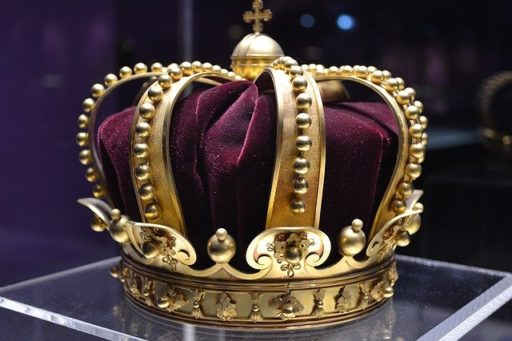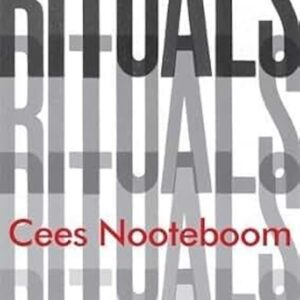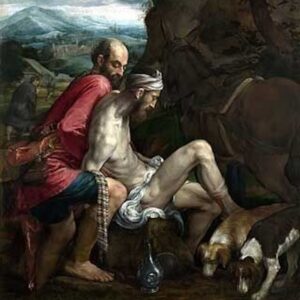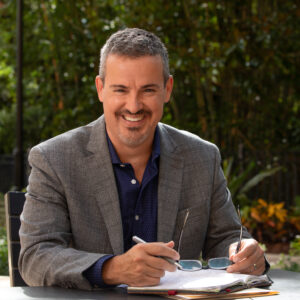Stories do not end. The teller of the tale falls silent. If the telling is done well, we feel we’ve truly seen into the world where fiction occurs, and when the teller of the tale falls silent we sense that the story goes on, just as it extends back further than we perceive before the teller began the tale. Or you could say we sense that the world of the tale is still there and extends in all directions, just as it did while we were in the tale. After all, that tale was only the smallest glimpse of the world of fiction, however sprawling and crucial the quest seemed.
This is one possible sense we are left with after a story’s apparent end. The other is the sense that everything has indeed come to a close and the world snuffed out, yet all about to begin again as if from nothing. Kierkegaard remarked that he thought stories all stopped where they should begin—at marriage—but what I think he was really pointing to was the moment where the ending of one story becomes the beginning of another, when everything has been concluded (the courtship) to begin again (the partnership, which is like the courtship transposed into another register, a modification of the same roles). I think of the shape of an hourglass.
In Western culture what may be the most famous story is this one: A king is born; but born in danger, for his coming has been foretold and a king always has rivals, and so he is hidden away in a backwater or foreign land. At the right time he rises to his true station: not just any king but a king above other kings, a high king. He brings peace and healing to the land and its people. But something goes wrong. Always something goes wrong, for deep down all is broken with us. The king is betrayed and killed—that is, hidden away again, this time in death, or so it seems. But he leaves behind the promise of his return. Rex quondam rexque futurus: the once and future king.
Adultery—or some other form of idolatry, the primordial deviation—is at the heart of this story, it is what goes wrong, what always goes wrong, at least from the human point of view. Arthur and Guinevere; or, holiness and what used to be called worldliness, which is a reversal of the two great commandments in the Christian and Jewish traditions: loving the neighbor and self (the human) above God. What goes wrong is nothing intrinsically evil but rather a disordering, deviation from the Way. Nevertheless the king is coming, and he will arrive in the last worst hour, when everything seems exhausted and altered almost beyond recognition. Then the story begins again, the same yet different.
All is broken and Something is coming. These are the twined ideas that govern and appear almost in these words throughout Paul Kingsnorth’s recently concluded trilogy of fiction: The Wake; Beast; Alexandria. Their order is important. In the first book, something comes—the Norman invasion of England—and it breaks everything, even the doughty (but already scarred) spirit and soul of the narrator, a stubbornly still pagan freeman of the Fens named Buccmaster, who tries to resist the invaders. In the second novel, a modern man named Edward Buckmaster retreats from the Fens or some flat place in the east of England to a high moor in the west, and there he breaks down in body and mind. This Buckmaster is not a Christian, but he is less opposed to the religion (or its vestiges in the landscape) than his medieval namesake. He undergoes a visionary or hallucinatory spiritual pilgrimage and transformation, like a medieval character—something out of Langland or the Pearl Poet. But it is debatable whether his story really ends or his visionary experience and madness simply recedes.
The real, visceral end of this story of Britain, perhaps the end of all story, comes in the final book of the trilogy, Alexandria. It is a suspenseful story, a classic fantasy adventure in its structure, recapitulating the range of the first two books, from east to west, from the flat shore of the North Sea to the higher country and hills of the west—the book ends at what must be Glastonbury Tor, perhaps the most hallowed, mythic and faery place in all Britain. Alexandria is set in a trans-human dystopia a thousand years from now, but though the earth is altered drastically, the geography of “old Albion” as it’s called, with its millennia of symbolism, ancient traces and aura, remains clear. You could say that Kingsnorth has written a new and very different version—but perceptibly still a version—of the Arthur story, which is to say the master story (at least in Western culture). It even comes complete with adultery, the emblematic primordial sin, or straying from the Way, in the Western imagination. There is no clearer ensign of the yetzer ha-ra, the inborn wayward inclination of the human being stemming from our embodied nature, our fundamental discord with Creation and our rebellion against the Law of its Maker.
Without revealing more details of the story, which is vividly rendered and well paced, I can tell you that Alexandria is about the end of the world, which is another statement of the return of the king theme or phase of the master story. If we’re following that model, the end is the beginning. Camelot must fall before the king may return. Or in the biblical story, the world is annihilated and then the story starts over: a new heaven and a new earth. Alexandria takes us right to that point, the end of the world that is poised to become a new beginning. All is broken. Something is coming. But is what’s coming a new story, or the same story again yet different, or a world after story? Or is this the wrong model, and it’s the first one I sketched that we should look to: the one where after the fiction has concluded we feel that the story, or the world of the story, continues?
all things are comin down around us. could be this is right. bring it all down. break it all. start again new. why not?
So thinks one character early in the novel. The master story that has propped up Western civilization can accommodate this thought. But we are concerned here with the fate of story as such in our unprecedented epoch, the Anthropocene. Another character, not human, says to the human characters:
let go of your story…
all you think is a story all the patterns you make of the world all you have told and believed here…
all stories are broken on the rock of the Way no tale is real no image will save you all makings of the mind are false
Is there, then, no story not the making of a human mind? Is there not one true story? The answer arises at one limit of fiction, where it meets religion, or its lack, or our yearning for such a bond.
Jonathan Geltner lives in Ann Arbor MI with his wife and two sons. His translation of Paul Claudel’s Five Great Odes is available from Angelico Press and a novel, Absolute Music, is forthcoming from Slant. He writes more about the meeting of fantasy and fiction with theology, philosophy, music and the sense of place at betweentwomaps.com





